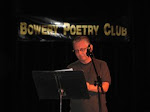The Wine.
In the bear lives a stork
and reads in the paste a place
and a bear goes firs into
this hole and greets the
scar at a gate
8/14/66
Translated by Gary Sullivan.
* * *
Der Wein.
Im Bären lebt ein Storch
Und liest im Taig einen Ort
Und ein Bär geht Tann in
dieses Loch und grüßt die
Narbe um ein Tor
* * *
Notes
I have no idea what either "Taig" or "Tann" mean. "Teig" means dough or paste. "Tanne" means fir tree.
Subscribe to:
Post Comments (Atom)

9 comments:
I found this in the OED:
Also taig-, tayg-, teyg-, -lech. [ad. Yiddish teyglekh pl. of teygl dough pellet, f. teyg dough + -l dim. suffix:—MHG. teic: see dough n.]
A Jewish confection made of small lumps of dough boiled in honey.
1903 Jewish Encycl. IV. 257/2 Teiglach and ingberlach are the two popular home-made candies. 1927 Amer. Mercury Feb. 206/2 The Sabbath tea would have been colorless without taiglech, one of the few gooey Jewish pastries. 1949 L. W. Leonard Jewish Cookery 321 Cook over reduced heat after all tayglach have been dropped into syrup. 1974 S. & E. Longstreet Joys of Jewish Cooking 66 Mix flour, baking powder, and eggs to a stiff dough+. Makes about 30 teiglach.
Und liest im Taig einen Ort
this is an amazing line
etymologically and in the Venned
oversense
Etymology
Old High German ort, originally *ord
which is almost word
giving it a directly 'Olsonian'
frisson if one likes that kind of thing
place directly equated to word
if only by sound
but one can shift it quickly to a rabelaisian or grotesque register
with
Etymology
From Middle Low German orte, refuse of food, cognate with early-modern Dutch ooræte, perhaps from Dutch oor-, out + etten, to eat
what a tantalizing line!!
cool one Gary!
wv: codder
"Taig" (also simply, not contradicting phaneronoemikon at all) is an old - and possibly mostly Austrian - writing for "Teig", i.e. dough
"Tann" is related to "fir", but rather means "Forest" here or, rather, in general. "Das dunkle Tann" means "The dark forest" in poetic, mostly 19th century use.
"Stier" may, of course, connote "bull", but what is evoked here seems rather "ein stierer blick", where "stier" means something like "transfixed"
I'll stay around.
Sorry, the "stier" comment refers to the "Der Morgen" poem, of course.
Hi Ekkehard!
Hey, it's great to see you here! I hope you're going to be able to get out to New York again ... please let me know if/when you do.
This is great info. I assume, based on what you say about Tann, that the lines probably would read:
And a bear goes into forest
this hole and greets the
???
Meanwhile, it sounds like I definitely need to change Der Morgen and get rid of the bull!
Anyway ... PLEASE come back whenever you have time and let me know what's wildly off-balance here!
Hi Gary,
I've been visiting your blog and lurking from time to time, but thought this is a chance to say hello. We're planning a trip to the West Coast next year, but perhaps we just might make a stopover in New York. I sure would be glad to see you (and say hello to Nada and the cats)
back to the Herbeck: "Der Wein" is a really strange one. In the line "Und ein Bär geht Tann in" you would expect an adverb in the place of "Tann" (to be precise, it would make perfect sense with: "dann", i.e. "then"). It doesn't really make sense grammatically as it is. So "firs" or "firest" or even "first" (and your word order: "goes firs into") seem all a bit Joycean but are absolutely possible here, I would say.
could it be
'treely'
in sense
his schitzoid process
was narratized as being like
animals and beings entering
him
he must've also had a specialized
language to understand this
as an emblematics of the his own
narrativation of his sickness
in the bear lives a stork
-ie something alien or other
or 'wrong'
and reads in the paste a place
could be an advanced staement
about what has been called the
'informe' a very popular post-modernist concept of paradoxical abjection or
formless form and vice versa
but also simply
a memory association
eg 'this dough reminds me of home'
kind of think
here it is
it is clear
it is a pun
on fur
a bear goes firrily
into this hole
its a bifurcated sense
neologism
there's probably a traditional term for it in linguistics
like Wolfsonism
or something
seems like i know it
a noun for an adverb
with a hybrid linking
mod/instance
Joyce did this alot
i'm pretty sure its
a naive or primitive
adverbial neologism
meant to iconistically
play off the pun
of
fur fir
Thanks, Lanny!
I think "firs" captures this, although I'm very tempted by "Treely."
The only hesitation with treely is that it hasn't got the "fur" association, which seems apt.
Keep going!!
It is excellentttt!!!
Treely fantastastic!!
Post a Comment